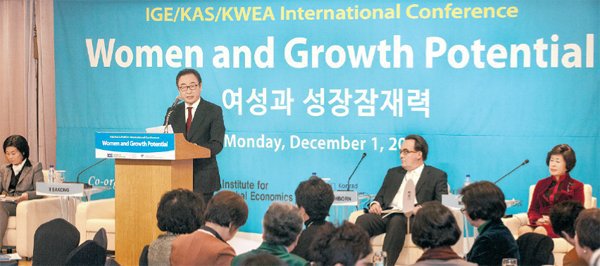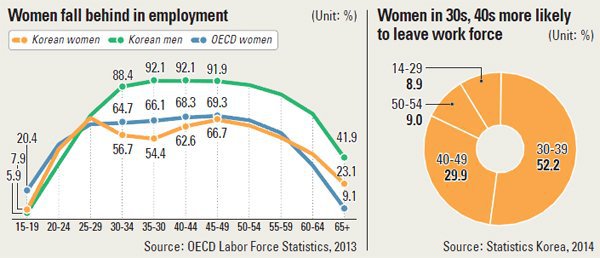Mothers struggle to return to work

Il Sa-kong, chairman of the Institute for Global Economics (IGE), talks about the importance of using women to bolster the nation's economic development during the Women and Growth Potential conference held at Lotte Hotel in central Seoul on Monday. By Park Sang-moon
Ms. Lee, a 35-year-old mother to a 4-year-old boy, has been trying to find a job for more than a year. She is constantly searching for work because the little income her husband brings home isn't enough to cover her family's growing expenses.
Like any parent, Lee hopes her child will receive a good education and wants to save enough money to put him through college.
The problem is that not many companies have working hours that are flexible enough to allow Lee to continue to build her career and attend to her child at the same time.
"My husband comes home really late because he works for a construction company, so I have to be the one who picks up our son at the day care center", said Lee. "But it really breaks my heart when I get there really late and my son is the only child left. Day care centers aren't open late at night, so when I'm stuck at work I feel immense stress".
Lee also said that the pay is low at most of the positions she finds.
"It's hard to find a decent job with flexible hours and fair pay, especially for a woman like me who is married and can't be fully committed to the office throughout the entire day", Lee said.
Many women in their 30s or older are facing the same problem.
A year ago, President Park Geun-hye stressed the need to maximize the economic participation of women, especially those whose careers have stopped in their tracks due to marriage and child care.
Immediately after the statement by the president, companies such as Samsung and Lotte rushed to announce plans to increase the number of women they recruit.
But a year later, it appears that the active employment of this group remains at a standstill.
With fear of deflation spreading and economic confidence shrinking amid turmoil in the global market, analysts are stressing the need to use the female work force to prop up the economy.
"Despite their high levels of education, Korea has a proportionately low number of female workers compared to other OECD member countries", said Il Sa-kong, chairman of the Institute for Global Economics (IGE), during the Women and Growth Potential conference held at Lotte Hotel in central Seoul on Monday.
According to labor force statistics by the OECD, Korea's employment-to-population ratio was 69.7 percent in 2013. But while the male employment rate was 80.8 percent, the number of female workers was much lower at 58.6 percent.
The biggest problem is that female employees quit their careers at an early stage due to marriage, child care or both. This is largely because there is a huge shortage of the infrastructure needed to allow women to continue working without worrying about raising children.
And even if these women try to find a job in later years, not many vacancies are available. In addition, the open positions are usually temporary jobs with lower pay and smaller or no welfare and health care plans.
"Studies show that women are as active as their male counterparts when searching for jobs when they are in their 20s, which shows that women are as interested in building their careers as men", saidKim Hee-jung, minister of gender equality and family, who was also at the conference.
"But the situation turns around and there is a vicious cycle for women where they find it difficult to find jobs or land a job with much less pay and benefits when they quit their job for the first time due to marriage or child care".
A Statistics Korea report released last month showed that 52.2 percent of women whose careers have been interrupted were in their 30s. In the state-run agency's survey, nearly a quarter of the interviewees in their 30s said they left their jobs because they became pregnant or gave birth.
Additionally, 35.2 percent of the survey participants said raising children was the biggest reason they quit pursuing their career.
"Even if [those women] find work again after a break, their wages are a lot less than that of women who kept their jobs", Minister Kim said. "That's why society needs more family-friendly corporations".
In order to retain a female work force, the ministry is emphasizing three areas: a flexible work system, child care facilities and a family-friendly corporate culture.
A flexible work system is crucial for women who are trying to balance family and work, said Park Hyun-suk, the director general of the Gender Equality Ministry's Women's Policy Bureau.
"When women who had their career interrupted were surveyed, 34.7 percent of those in their 30s and 40.9 percent of those in their 40s wanted jobs with flexible work hours", Park said. "It's also important to improve the quality of child care facilities. There is enough demand for child care facilities in Korea, but because private facilities aren't up to par with public ones, there is a mismatch".
The ministry also offers an in-house child care service for households where children are too young to be placed in child care facilities or when the hours of service aren't long enough, Kim said. It has established 140 re-employment support centers nationwide that offer services like job counseling and training, too.
Overall, these policies will ultimately contribute to a better representation of women in senior-level positions, Kim explained.
"Women still represent a small [portion] of their organizations even at public institutions", Kim said. "[Reports say] corporations with two or more women on the board are ahead of the [respective] sector's average performance".
According to McKinsey database estimates from 2011, 40 percent of women in Korea join the work force as entry-level professionals. However, those who reach mid-to-senior management positions make up just 6 percent. About 2 percent represent executive committees and less than 1 percent become CEOs. Compared to Singapore - where 20 percent of women were estimated to reach the mid-to-senior level and 8 percent become CEOs - the figures are disheartening.
However, the country is working toward having a better representation of women with policies like quotas, said Minister Kim.
There are measures to help fathers have a better work and life balance, the minister said, emphasizing that it takes efforts from everyone to help change society.
BY KIM EUN-JI, LEE HO-JEONG [eunjik@joongang.co.kr]
Source from :Hancinema

